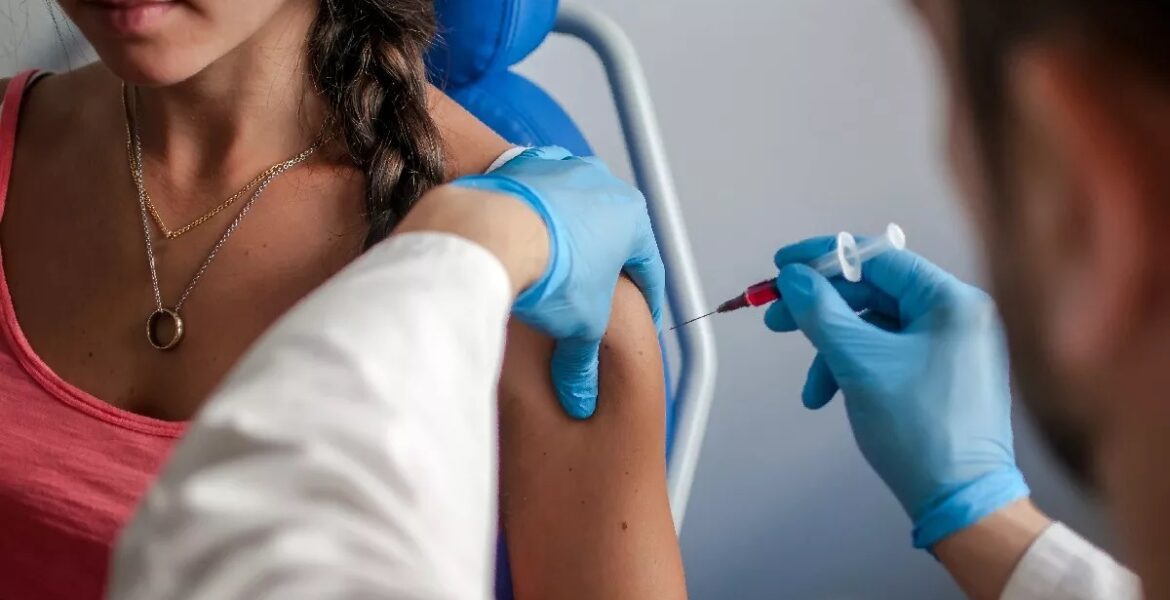Measles has significantly risen this year, with 19 cases being registered in Greece, as well as pertussis, with two neonatal deaths.
Three children's diseases, theoretically forgotten, are worrying Greek health experts as they have made a dynamic reappearance.
Since the beginning of 2024, measles has reappeared in European countries, with registered cases even in Greece. A significant outbreak of pertussis (whooping cough) is being observed at a time when meningitis is also a concern for experts and parents.
“The low acceptance of COVID-19 vaccinations is due to misinformation about vaccine safety, which does not mention the health benefit to huge populations, estimated at millions of lives annually and globally," said Professor Sotiris Tsiodras at the Press Conference held on Thursday for the opening of the 23rd Panhellenic Conference of the Hellenic Society of Infectious Diseases.
"Questioning vaccinations for other diseases is expected to have more general consequences for the overall vaccination effort and public health. As a tragic example, after many years, epidemics of measles, whooping cough and diphtheria are re-recorded in Europe," he added.
From the beginning of the year until 7 March, 19 measles cases were recorded in Greece, of which five were in healthcare facilities, especially in Attica and Crete. The vast majority are people of Greek nationality from the general population, mainly in the 40-55 age group, who are not immune to measles, including health professionals, and are unvaccinated or still need to complete their vaccinations.
Meanwhile, apart from measles, there is concern for other diseases, such as whooping cough. In the last few days, another newborn lost their life. Since the beginning of the year, two newborn deaths and a total of 34 cases of whooping cough have been recorded in Greece.
According to the Professor of Pediatrics - Infectious Diseases, Athanasios Michos, there is a 30% chance that those who get whooping cough will develop epilepsy later.
The dangerous meningitis
The Hellenic Society of Infectious Diseases Board of Directors could not exclude meningitis from its intervention against contagious diseases since all three cases recorded in less than three months in Patras are considered local outbreaks.
The cases of students at the Universities of Patras and Peloponnese have caused a health alarm in Patras and Greece in general. The Patras Carnival celebration is intensifying the concern.
A Hellenic National Public Health Organization (EODY) team has been in Patras since Thursday, conducting briefings for the students studying in the departments where the cases appeared.
EODY will administer chemoprophylaxis to those who were in contact with the infected. Targeted vaccination of close contacts will also be encouraged.
The cases of meningitis bring back the debate on the reimbursement of the vaccine against meningococcal type B, which until now is given free of charge only to high-risk children, as the number of cases recorded in Greece is considered small. However, according to Mr Tsiodras, discussions are taking place in the National Vaccination Committee about protecting infants, and there are positive suggestions.
Greece has two vaccines against meningococcal type B—one costs about 105 euros and the other about 90. The second one is approved for ages over ten years. Three doses are recommended for children under two years of age, while two doses are given for children aged two and over.
A child, a teenager or even an adult at any time in their life can receive the vaccine. Many parents, of course, face a real dilemma in front of the high cost of the vaccine, since if there are two children in the family, it is at least 400 euros.
Pan-resistant germs and the lack of antibiotics
The Greek Intensive Care Units need help with the availability of efficient antibiotics that deal with pan-resistant and multi-resistant microbes. This major public health issue was highlighted at the conference.
Professor Tsiodras spoke about the high mortality due to multi-resistant pathogens, a serious health challenge in Greece.
The Board of Directors of the Society of Infections has announced that it will submit a memorandum with antibiotics necessary to treat hospital infections to the Ministry of Health.
In particular, according to the Professor of Infectious Diseases of the National and Kapodistrian University of Athens, Nikos Sypsas, what is happening in Greece is that resistant microbes have specific enzymes that inactivate all antibiotics and two classes of drugs seem to be effective: Either old, very cheap antibiotics, which, as Mr Sypsas said, because they are cheap, companies have no interest in marketing them, or newer, innovative antibiotics that are expensive and therefore not easily available.
In several cases, the Institute of Pharmaceutical Research and Technology (IFET) is forced to bring antibiotics with emergency admissions to cover in-hospital needs.
According to the data provided by Mr. Sypsas, Greece is the number one country in Europe that consumes antibiotics. Regarding their use in hospitals, Greece dropped to sixth place in 2020-2022, showing a more rational use of antibiotics.
Greece, however, remains the country with the highest number of deaths in Europe due to multi-resistant microbes.
Maria-Niki Georganta is a columnist for Ygeia Mou.
READ MORE: Surge in syphilis and gonorrhea cases in Greece (2020-2022)


